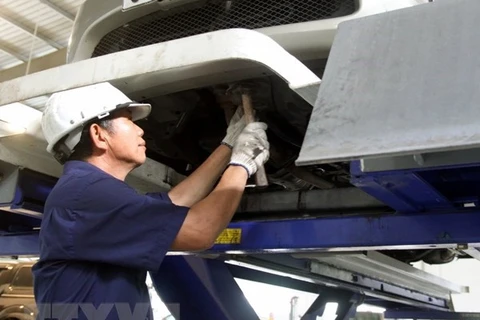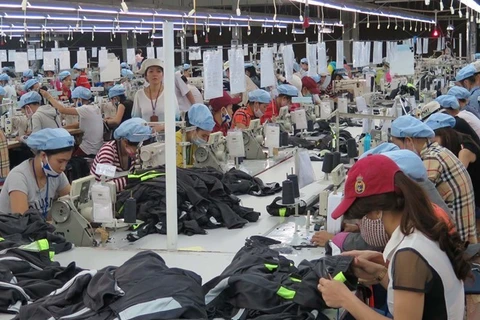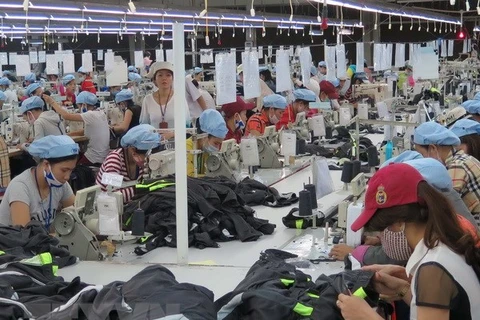 Workers at Trung Dung Co Ltd, a manufacturer of elastic threads and yarn in Tan Trieu Commune in Hanoi’s suburban district Thanh Tri. The company employs around 200 employees. (Photo: VNA)
Workers at Trung Dung Co Ltd, a manufacturer of elastic threads and yarn in Tan Trieu Commune in Hanoi’s suburban district Thanh Tri. The company employs around 200 employees. (Photo: VNA) Hanoi (VNA) - A forum on measures to improve capital access for small- and medium-sized enterprises (SMEs) took place in Hanoi on August 8, looking at difficulties of both firms and banks in the matter.
According a report of the Vietnam Chamber of Commerce and Industry (VCCI), loans provided for SMEs account for 21 percent of the total outstanding loans. Up to 60 percent of SMEs are still unable to access or use bank capital, particularly start-ups who begin with ideas and plans rather than capital and assets.
The SME Development Fund, set up in 2014 with total capital of 2 trillion VND (88 million USD), has so far lent 145 billion VND to 19 businesses, heard the forum.
VCCI Chairman Vu Tien Loc said the credit shortage for SMEs is blamed on three parties. The first is the State whose representatives are the State Bank of Vietnam and other relevant ministries and agencies. The second is banks and financial institutions, and the third is the micro, small and medium-sized enterprises (MSMEs).
On the state side, there are still many legal regulations that do not encourage investment and creative businesses, according to Loc. Banks and other financial institutions are still in favour of State-owned enterprises and enterprises having asset collateral.
However, he pointed to the fact that the digital economy, startups and agricultural businesses do not have a lot of assets, while such important resources as business projects and ideas are less likely to be considered proper collateral.
Meanwhile, a majority of nearly 700,000 MSMEs in Vietnam do not have collateral assets, many demonstrate low transparency and weak governance, Loc noted, adding that is the reason why banks and other financial institutions say no to them.
Sharing the VCCI Chairman’s opinion, Nguyen Quoc Hung, head of the central bank’s Credit Department, admitted difficulties that the business group still faced in accessing bank loans are due to their lack of not only collateral but also attention to updating business activities and preparing financial statements. Their financial data is often slowly updated, inaccurate and not reviewed by independent audit, affecting the evaluation process for bank loans.
He said weak performance of authorities and guarantee funds at localities is also added to the problem.
Experts at the forum recommend that the three parties involved ought to work together to clear the riddle.
VCCI Chairman Loc said the State needs to step up reform in terms of legal framework, which would encourage bank loans offered to SMEs and startups.
He suggested that banks consider accepting mortgages in the form of ideas, business and production plans from startups and high-tech agricultural companies, while financial and insurance institutions should better interact with the group to facilitate them.
Loc also stressed the necessity of a transparent management system and capacity building for drafting business plans among enterprises.
Hung, meanwhile, suggested building a mechanism to tackle risks associated with loans for SMEs.
According to financial expert Can Van Luc, the State needs to quickly implement an effective legal framework for supporting SMEs, while strengthening the role of business associations and cooperation among financial institutions and credit guarantee funds.
Meanwhile, small businesses should also improve transparency, disclosure and willingness to work with credit institutions.-VNA
VNA























